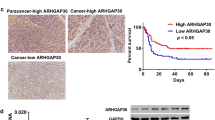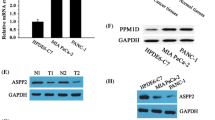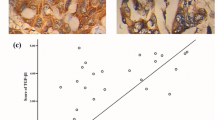Abstract
Pancreatic cancer is difficult to manage owing to the challenges involved in its treatment and nursing. This study aimed to clarify the roles and mechanisms of action of Poly (A)-binding protein cytoplasmic 1 (PABPC1) on pancreatic cancer. The expression of PABPC1 in pancreatic cancer tissues and cell lines was detected using RT-qPCR and western blotting. The effects of PABPC1 on proliferation, apoptosis, epithelial-mesenchymal transition (EMT), and the PI3K/AKT signaling pathway in pancreatic cancer cells were further investigated using MTT assays, flow cytometry, and western blotting. The expression of PABPC1 was significantly upregulated in pancreatic cancer tissues and cells, whereas PABPC1 downregulation inhibited pancreatic cancer cell proliferation, induced apoptosis, decreased the expression of EMT-associated proteins, and exerted a regulatory effect by inhibiting the PI3K/AKT signaling pathway. In addition, the findings indicated that PABPC1 over-expression significantly promoted pancreatic cancer cell proliferation, inhibited apoptosis, decreased the expression of E-cadherin, enhanced N-cadherin expression, and activating the PI3K/AKT signaling pathway. PABPC1 silencing significantly inhibited proliferation and EMT and induced apoptosis in pancreatic cancer cells. These findings provide novel insights into the role of PABPC1 in the development of pancreatic cancer.










Similar content being viewed by others
Data availability
The datasets used and/or analyzed in the current study are available from the corresponding author upon reasonable request.
References
Andersson R, Haglund C, Seppanen H, Ansari D (2022) Pancreatic cancer-the past, the present, and the future. Scand J Gastroenterol 57:1169–1177. https://doi.org/10.1080/00365521.2022.2067786
Chen H, Zhou L, Wu X, Li R, Wen J, Sha J, Wen X (2016) The PI3K/AKT pathway in the pathogenesis of prostate cancer. Front Biosci (Landmark Ed) 21:1084–1091. https://doi.org/10.2741/4443
Di Martino M, El Boghdady M (2023) Pancreatic cancer surgery. BMC Surg 23:196. https://doi.org/10.1186/s12893-023-02091-7
Feng C, Han YH, Qi N, Li J, Sheng QH, Liu Y, Yang LL (2021) Functional implications of PABPC1 in the development of ovarian cancer. Open Med 16:805–815. https://doi.org/10.1515/med-2021-0278
Gadgeel SM, Wozniak A (2013) Preclinical rationale for PI3K/Akt/mTOR pathway inhibitors as therapy for epidermal growth factor receptor inhibitor-resistant non-small-cell lung cancer. Clin Lung Cancer 14:322–332. https://doi.org/10.1016/j.cllc.2012.12.001
Gugenheim J, Crovetto A, Petrucciani N (2022) Neoadjuvant therapy for pancreatic cancer. Updates Surg 74:35–42. https://doi.org/10.1007/s13304-021-01186-1
Guven E (2022) Gene expression characteristics of tumor and adjacent non-tumor tissues of pancreatic ductal adenocarcinoma (PDAC) in-silico. Iran J Biotechnol 20:e3092. https://doi.org/10.30498/ijb.2021.292558.3092
Hronek JW, Reed M (2015) Nursing implications of chemotherapy agents and their associated side effects in patients with pancreatic cancer. Clin J Oncol Nurs 19:751–757. https://doi.org/10.1188/15.CJON.751-757
Hu Y, Jing J, Shi Y, Zhang P, Dong D, Wu Y, Dong X, Li E, Fan Y (2021) Apatinib inhibits pancreatic cancer growth, migration and invasion through the PI3K/AKT and ERK1/2/MAPK pathways. Trans Cancer Res 10:3306–3316. https://doi.org/10.21037/tcr-21-207
Jie Zhu HD, Wang X, Lu Q (2015) PABPC1 exerts carcinogenesis in gastric carcinoma by targeting miR-34c. Int J Clin Exp Pathol 8:3794–3802
Klein AP (2021) Pancreatic cancer epidemiology: understanding the role of lifestyle and inherited risk factors. Nat Rev Gastroenterol Hepatol 18:493–502. https://doi.org/10.1038/s41575-021-00457-x
Kumar P, Nagarajan A, Uchil PD (2018) Analysis of cell viability by the MTT assay. Cold Spring Harbor Protoc. https://doi.org/10.1101/pdb.prot095505
Kyung-Hee Chun JWKI, Shihua Sun JM, Pezzuto R, Lotan WK, Lee HH-Y (2003) Effects of deguelin on the phosphatidylinositol 3-Kinase/Akt pathway and apoptosis in Premalignant Human bronchial epithelial cells. J Natl Cancer Inst 95:291–302. https://doi.org/10.1093/jnci/95.4.291
Lei Y, Liu B, Su L, Xie X, Kuang M, Chen M, Lan H, Zhao H, Lin M (2020) Perioperative nursing of patients with pancreatic cancer treated with a nanoknife. J Nanosci Nanotechnol 20:6584–6590. https://doi.org/10.1166/jnn.2020.18603
Li J, Pei M, Xiao W, Liu X, Hong L, Yu Z, Peng Y, Zhang J, Yang P, Lin J, Wu X, Lin Z, Tang W, Zhi F, Li G, Xiang L, Li A, Liu S, Chen Y, Wang J (2023) The HOXD9-mediated PAXIP1-AS1 regulates gastric cancer progression through PABPC1/PAK1 modulation. Cell Death Dis 14:341. https://doi.org/10.1038/s41419-023-05862-5
Liu X, Wen L, Gao C (2022) Effect of evidence-based nursing on quality of life and nursing satisfaction of patients with severe pancreatic cancer. Minerva Gastroenterol 68:495–497. https://doi.org/10.23736/S2724-5985.22.03241-7
Luo W, Tao J, Zheng L, Zhang T (2020) Current epidemiology of pancreatic cancer: challenges and opportunities. Chin J Cancer Res 32:705–19
Ma W, Zhang L, Wang C, Xu X (2022) Effect of multidisciplinary team collaborative nursing model combined with mind mapping teaching method on postoperative complications and mental health of patients with advanced pancreatic cancer. Iran J Public Health 51:535–543. https://doi.org/10.18502/ijph.v51i3.8929
Meng X, Xiao W, Sun J, Li W, Yuan H, Yu T, Zhang X, Dong W (2023) CircPTK2/PABPC1/SETDB1 axis promotes EMT-mediated tumor metastasis and gemcitabine resistance in bladder cancer. Cancer Lett 554:216023. https://doi.org/10.1016/j.canlet.2022.216023
Mortazavi M, Moosavi F, Martini M, Giovannetti E, Firuzi O (2022) Prospects of targeting PI3K/AKT/mTOR pathway in pancreatic cancer. Crit Rev Oncol/Hematol 176:103749. https://doi.org/10.1016/j.critrevonc.2022.103749
Mukherji R, Debnath D, Hartley ML, Noel MS (2022) The role of immunotherapy in pancreatic cancer. Curr Oncol 29:6864–6892. https://doi.org/10.3390/curroncol29100541
Ozturk S, Uysal F (2017) Poly(A)-binding proteins are required for translational regulation in vertebrate oocytes and early embryos. Reprod Fertil Dev 29:1890–1901. https://doi.org/10.1071/RD16283
Ozturk S, Uysal F (2018) Potential roles of the poly(A)-binding proteins in translational regulation during spermatogenesis. J Reprod Dev 64:289–296. https://doi.org/10.1262/jrd.2018-026
Shao Q, Zhang Z, Cao R, Zang H, Pei W, Sun T (2020) CPA4 promotes EMT in pancreatic cancer via stimulating PI3K-AKT-mTOR signaling. OncoTargets Therapy 13:8567–8580. https://doi.org/10.2147/OTT.S257057
Spross JA, Manolatos A, Thorpe M (1988) Pancreatic cancer: nursing challenges. Semin Oncol Nurs 4:274–284. https://doi.org/10.1016/0749-2081(88)90079-4
Stoffel EM, Brand RE, Goggins M (2023) Pancreatic cancer: changing epidemiology and new approaches to risk assessment, early detection, and prevention. Gastroenterology 164:752–765. https://doi.org/10.1053/j.gastro.2023.02.012
Tailai An LD, Wang Y, Yang Z, Chai C, Ouyang J, Lu X, Zhang C (2021) The prognostic impacts of PABPC1 expression on gastric cancer patients. FutureOncol 17:4471–4479
Vincent A, Herman J, Schulick R, Hruban RH, Goggins M (2011) Pancreatic cancer. Lancet 378:607–620. https://doi.org/10.1016/s0140-6736(10)62307-0
Wen X, Shao Z, Chen S, Wang W, Wang Y, Jiang J, Ma Q, Zhang L (2020) Construction of an RNA-binding protein-related prognostic model for pancreatic adenocarcinoma based on TCGA and GTEx databases. Front Genet 11:610350. https://doi.org/10.3389/fgene.2020.610350
Wood LD, Canto MI, Jaffee EM, Simeone DM (2022) Pancreatic cancer: pathogenesis, screening, diagnosis, and treatment. Gastroenterology 163:386–402. https://doi.org/10.1053/j.gastro.2022.03.056
Wu YQ, Ju CL, Wang BJ, Wang RG (2019) PABPC1L depletion inhibits proliferation and migration via blockage of AKT pathway in human colorectal cancer cells. Oncol Lett 17:3439–3445. https://doi.org/10.3892/ol.2019.9999
Yao W, Yao Y, He W, Zhao C, Liu D, Wang G, Wang Z (2023) PABPC1 promotes cell proliferation and metastasis in pancreatic adenocarcinoma by regulating COL12A1 expression. Immun Inflamm Dis 11:e919. https://doi.org/10.1002/iid3.919
Yu L, Wei J, Liu P (2022) Attacking the PI3K/Akt/mTOR signaling pathway for targeted therapeutic treatment in human cancer. Sem Cancer Biol 85:69–94. https://doi.org/10.1016/j.semcancer.2021.06.019
Zhang Y, Chen C, Liu Z, Guo H, Lu W, Hu W, Lin Z (2022) PABPC1-induced stabilization of IFI27 mRNA promotes angiogenesis and malignant progression in esophageal squamous cell carcinoma through exosomal miRNA-21-5p. J Exp Clin Cancer Res 41:111. https://doi.org/10.1186/s13046-022-02339-9
Acknowledgements
Not applicable.
Funding
No fundings were recieved.
Author information
Authors and Affiliations
Contributions
Changren Zhu and Cuimei Wang contributed to data collection, statistical analysis, data interpretation and manuscript preparation. Jun Zheng contributed to data collection and manuscript preparation. Xiaodong Wang, Shuangshuang Dong, and Qing Xu contributed to data collection and data interpretation. All authors have read and approved the final manuscript.
Corresponding author
Ethics declarations
Conflict of interest
The authors declare no competing interests.
Ethical approval
This study was approved by the Ethics Committee of Northern Jiangsu People’s Hospital of Jiangsu Province.
Consent to participant
All participants providedsigned informed consent.
Consent for publication
All patients agreed for publication.
Additional information
Publisher’s Note
Springer nature remains neutral with regard to jurisdictional claims in published maps and institutional affiliations.
Supplementary Information
Below is the link to the electronic supplementary material.
Supplementary material 1 (TIF 1380.6 kb)
Effect of PABPC1-siRNA on the proliferation and apoptosis of normal human pancreatic epithelial cell line HPDE 6-C7.HPDE 6-C7 cells were transfected with control-siRNA of PABPC1-siRNA for 48 h. A Cell proliferation was assessed by MTT assay. B and C Cell apoptosis was determined by FCM
Rights and permissions
Springer Nature or its licensor (e.g. a society or other partner) holds exclusive rights to this article under a publishing agreement with the author(s) or other rightsholder(s); author self-archiving of the accepted manuscript version of this article is solely governed by the terms of such publishing agreement and applicable law.
About this article
Cite this article
Zhu, C., Wang, C., Wang, X. et al. PABPC1 silencing inhibits pancreatic cancer cell proliferation and EMT, and induces apoptosis via PI3K/AKT pathway. Cytotechnology (2024). https://doi.org/10.1007/s10616-024-00626-1
Received:
Accepted:
Published:
DOI: https://doi.org/10.1007/s10616-024-00626-1




